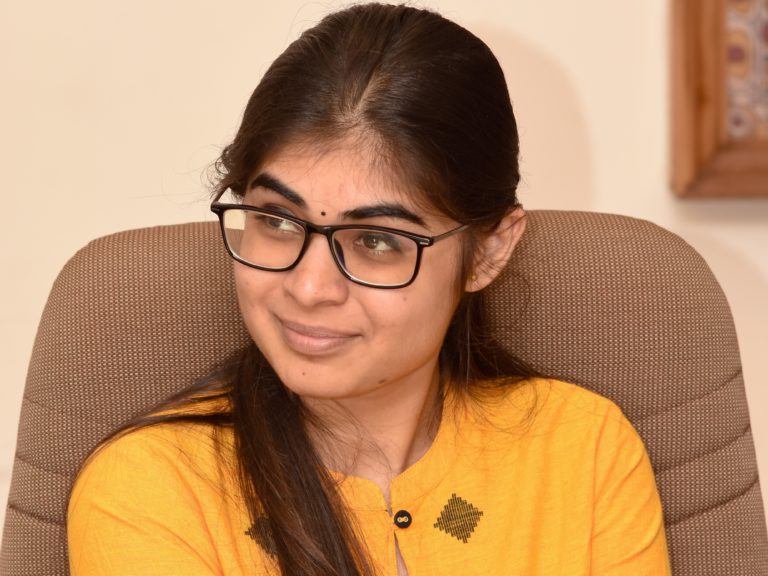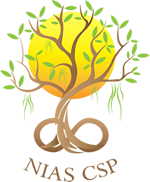
Niharika Sharma
Contact Information
Niharika Sharma is currently working as a Doctoral scholar, Consciousness Studies Programme, School of Humanities, National Institute of Advanced Studies (NIAS), Indian Institute of Science Campus, Bengaluru. (July 2018 – Present) under the guidance of Prof Sangeetha Menon, Professor, NIAS. Her research thesis title is “Parāsamvit and Pratyabhijñā: An Onto-Epistemic Enquiry in Trika Philosophy”. Her research interests include Indian philosophy, textual analysis, and conceptual analysis. She also attempts to develop comprehensive philosophical theories of the Trika school.
Educational Background:
- PhD (2018 – ongoing) Thesis Title – Parāsamvit and Pratyabhijñā: An Onto-Epistemic Enquiry in Trika Philosophy Supervisor – Prof Sangeetha Menon, Head – NIAS Consciousness Studies Programme, Dean – School of Humanities, NIAS.
- Masters in Indian Philosophy and Religion (2016 – 2018) – Banaras Hindu University, Varanasi.
- Bachelors in Philosophy (2013 – 2016) – Janaki Devi Memorial College, Delhi University.
Śaivism is one of the oldest and major Tantric traditions that denotes Śiva as the Ultimate Reality. Śaivism became popular in the 1st millennium CE. This tradition developed into further sub-traditions broadly categorized into three groups: theistic dualism, nontheistic monism, and those that combine features or practices of the two. Alexis Sanderson classifies Śaivism into two: Atimārga (way for Śaiva monks) and Mantrāmārga (way followed by both the renunciates (sannyasi) and householders (grihastha). The present research work focuses on the Trika school, an absolutist, monistic, theistic, and idealist school under the ambit of the Mantrāmārga category. The research originates with the conviction that the tradition of Trika philosophy has much to contribute to human society. It is unfortunate that the tradition remained in the periphery and did not receive its due in the scholarly community. Trika school not only bridges the gap of religion (tradition) and philosophy, but also improvises upon the prominent theories put forth by other Indian Philosophical schools such as Sāṅkhya, Advaita Vedānta, Yogācāra, and Sābdika philosophy. Thus, the first objective of the research study is to discuss the various facets that shaped Trika Philosophy which allowed other Philosophical schools to come within its ambit and enrich it. Secondly, to take into account the inclusive nature of Trika Philosophy to provide a comprehensive conceptualization of consciousness (Parāsamvit). The research methodologies applied for the research are Textual analysis, Conceptual analysis, and Critical Inquiry.
- Kashmir Shaivism – An Absolutist View, a philosophical talk for Reading Glass Presentation at Consciousness Studies Programme, National Institute of Advanced Studies, Bengaluru on 18 October 2018.
- Reflection – A Sneak Peak at the Past, a philosophical talk for Reading Glass Presentation at Consciousness Studies Programme, National Institute of Advanced Studies, Bengaluru on 5 July 2019.
- ‘What’ and ‘How’ of Existence: Perspectives from Schools of Indian Philosophy, Quintessence of Being: Examining Existence and Experience online course conducted by the Consciousness Studies Programme, National Institute of Advanced Studies on 9 September 2020.
- The Method of Pratyabhijñā: A Śaivite Pursuit of Self, a paper presentation for a National Seminar titled ‘Philosophy and the Method: Phenomenology and Indian Philosophy’. The seminar was organized by ICPR, New Delhi in Collaboration with S.R. School of Philosophical Studies, AU on 6 December 2021.
- “Sharma, N. (2021). The Trika School – A Religio-Philosophical Emergence. Tattva Journal of Philosophy, 13(2), 41-58. https://doi.org/10.12726/tjp.26.3“.
Initiatives Coordinated:
- Doctoral Advisory Committee Meetings (2019 – 2020)
- Svāsthya-rasa-bodhinī Public Lecture Series (2019 – 2020)
- Panel Discussions – Evening Philosophy Chat (2019)
- Friday Lecture Series (2020 – 2021)
Courses Coordinated:
- Knowing, Experiencing and Being: Methods, Applications and Philosophies inspired by Phenomenology, Collective Frameworks, and Reflective Capabilities Course (2020)
- Nine Dimensions of The Lockdown Experience Course (2020)
- Readings From Indian Aesthetics Course (2020)
- Introduction to Western Classical Music Course (2021)
- Research Writing and Communication Course (2021)
- Philosophy, Self, and Consciousness: Exploring the Context of Experience Course (2021)
Workshop Coordinated:
- A Two-Day International Workshop on “Facets of AI” (2020)
- University Gold Medalist (BHU MEDAL) and Certificate of Merit was awarded for securing First position at M.A. Indian Philosophy & Religion, Banaras Hindu University, Varanasi. (2018).
- Pt. Raghunandan Lal Dar Medal (Department Gold Medal) was awarded for securing highest CGPA in M.A. Indian Philosophy & Religion, Banaras Hindu University, Varanasi. (2018).
- Smt. Raj Kumari Dar Prize was awarded for securing First position at M.A. Indian Philosophy & Religion, Banaras Hindu University, Varanasi. (2018).
- Sharda Jain Scholarship in Philosophy and Certificate of Merit was awarded at B.A Philosophy, Janki Devi College, Delhi University. (2016).
- College Outstanding Achiever was awarded by Janki Devi Memorial College, Delhi University. (2016).
- Best Project Award (Directing Discourse) was awarded for the best sustainability project by TERI & Genpact.(2015).

